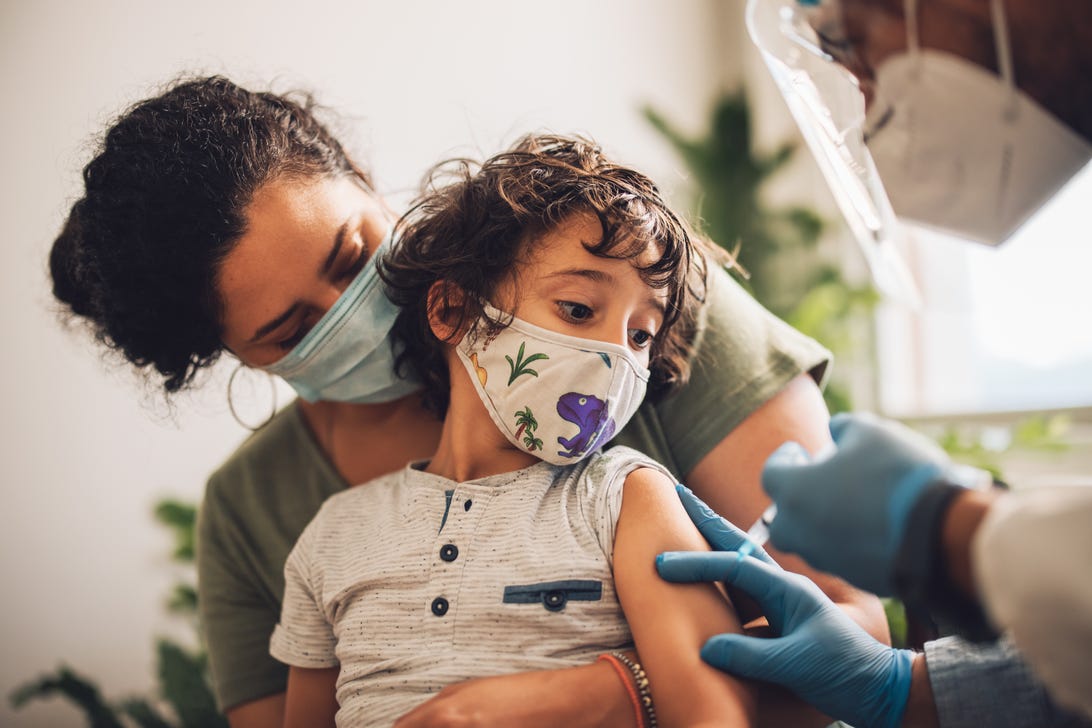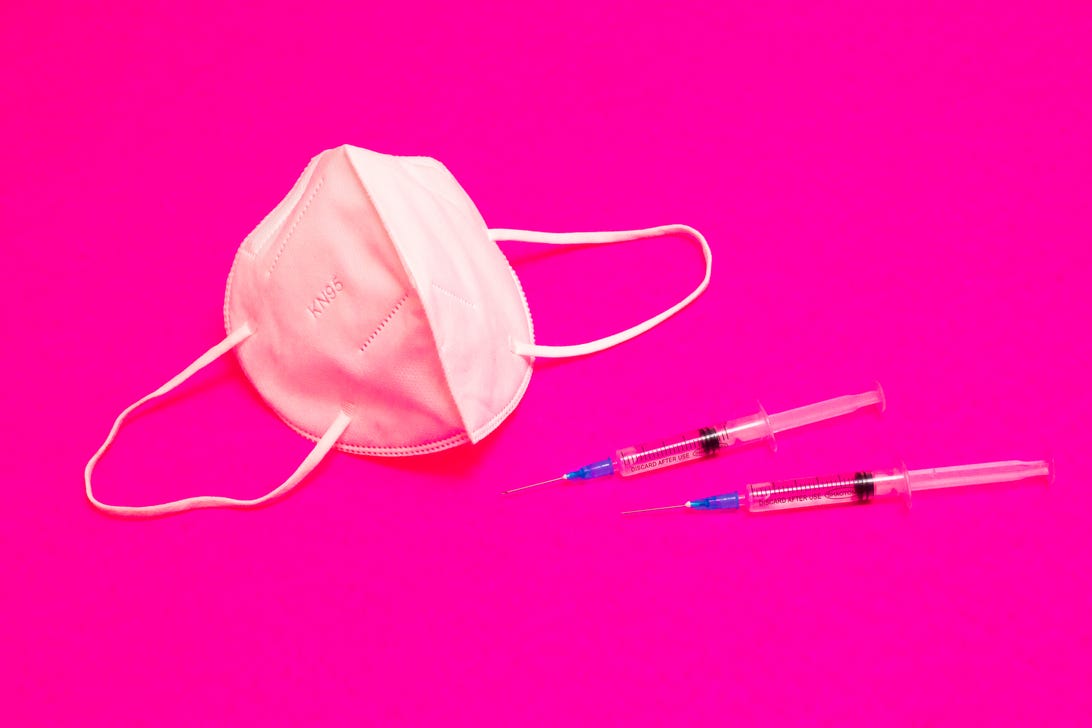

School mask mandates are expiring across the US.
Getty Images
The wait for parents anxious to vaccinate their young children against COVID-19 may have gotten shorter. Moderna is joining Pfizer and BioNTech in the submission process to the US Food and Drug Administration with its vaccine for children 6 months through 5 years. The company will submit its data for authorization in the coming weeks, it said.
The immune response generated in children under age 6 with Moderna’s small-dose vaccine (one-fourth the size of the adult primary series) mimics the response seen in adults — a benchmark vaccine researchers use when gauging potential effectiveness for younger age groups. It also has a favorable safety profile in children as young as 6 months, the company said.
The company also announced it’s seeking authorization for its vaccine for kids 6 to 11 and wants to extend US authorization of the vaccine for kids and teens. If Moderna gets the green light, kids and their parents will have a second COVID-19 vaccine option.
Pfizer and BioNTech’s vaccine is authorized for kids and teens age 5 and older. Children under 5 are the only age group who can’t get vaccinated against COVID-19.
In February, Pfizer and BioNTech’s COVID-19 vaccine for kids and babies was paused after the companies announced they were extending their “rolling submission” authorization process for the vaccine for kids 6 months up to 5 years in order to study a third dose of the vaccine. Though two doses of Pfizer’s smallest-dose vaccine were effective in babies and toddlers up to 2 years, the vaccine wasn’t effective in kids 2 through 4 years.
The smaller-dosed children’s vaccines, and the circulation of the omicron variant, have riddled the authorization process for the youngest age group as researchers scramble to find a dosing that’ll work. Moderna’s positive announcement about its two-dose vaccine for kids is good news for parents, but it also reflects a caveat about the efficacy of primary vaccine series in the era of omicron, a variant that’s diminished infection protection for adults and kids alike (and is part of the reason health officials have called for booster doses in those eligible).
Jeff Zients, the White House COVID-19 Response team coordinator, said Wednesday that the government has enough supplies to vaccinate children under age 5 if and when the COVID-19 vaccine is authorized and recommended for that age group. The White House has warned that without congressional approval for more COVID-19 funding, the government won’t be able to cover, for one example, fourth shots if they’re needed for all Americans. The Uninsured Program for COVID-19 testing and treatments for Americans without health insurance has already stopped accepting claims.
Though parents of kids under age 5 will need to wait for FDA authorization (and then the CDC’s recommendation), children age 5 and older can get vaccinated now. Here’s everything we know about COVID-19 vaccines for babies, kids and teens.
Read more: 4th COVID Vaccine: Does a Second Booster Work?
Moderna’s COVID vaccine for kids under 6: Is it effective?
Moderna is submitting data on a vaccine for kids 6 months through 5 years (up to 6 years). It’s two doses — one-fourth the size (25 micrograms) of Moderna’s vaccine for adults — given 28 days apart.
The vaccine had a favorable safety profile in the study, Moderna said, and while the vaccine efficacy is relatively lower compared with the efficacy rates seen earlier in the pandemic (43.7% for kids 6 months to 2 years, and 37.5% for children 2 to 6 years), this is “consistent with adult observational data” during the omicron wave, the company said.
If the FDA also authorizes Moderna’s COVID-19 vaccine for kids 6 to 12, it’ll be the company’s adult booster size — 50 micrograms, or one half the size given to adults as their first two shots. Moderna’s vaccine is regulated for kids as young as 6 in Canada, Australia and the European Union.
Moderna is asking the FDA to extend the use of its adult vaccine for kids age 12 to 17. But right now the only vaccine available for kids under 18 in the US is Pfizer’s.
Read more: What to Know About BA.2, or COVID’s ‘Stealth Omicron’ Variant
What about Pfizer’s child vaccine? Can my kid be vaccinated now?
Pfizer and BioNTech’s vaccine for children 6 months through 4 years (up to 5 years) comes in two doses that are one-tenth the volume of the vaccine for people age 12 and up, a slightly smaller dose than Moderna’s prospective vaccine for the age group. A third 3-microgram dose is being researched right now and is expected to complete the series.
The currently authorized and available COVID-19 vaccine for kids 5 to 11 is one-third the dose given to everyone 12 and up, and it’s delivered in two doses. Pfizer’s vaccine for kids can also be stored for up to 10 weeks in a fridge, making it easier to administer, and the cap on the vial is orange instead of purple and gray to avoid mix-ups.
And if it helps put your kids at ease, you can let them know the needle used to administer the child’s dose of vaccine is also smaller.
For more information about Pfizer’s vaccine for children ages 5 to 11, check out this FDA fact sheet.

Getty Images
Can older kids get a COVID booster?
Children as young as 12 can now get a booster dose of Pfizer’s COVID-19 vaccine, given at least five months after their primary vaccination series.
Most kids younger than 12 can’t get a booster, although the CDC recommends a third dose of the Pfizer vaccine for children 5 and up who are immunocompromised. They’re eligible for a third shot 28 days after their second dose.
Where can my kid get a booster shot?
Since Pfizer’s COVID-19 vaccine is the lone vaccine currently authorized for kids and teens, it’ll generally be available in doctor’s offices and public health clinics, not pharmacies and other mass vaccination sites.
Call your pediatrician or local health clinic for a recommendation on where to go. Parents may also text their ZIP code to 438829 or use this vaccine finder link to find a clinic near them that has the child vaccine available.
Read more: School Mask Mandates — Only One State Hasn’t Announced End to Masks in the Classroom
Do kids even need a COVID-19 vaccine?
Children are much less likely to get severely sick from the virus than adults, but some children have died or been hospitalized with COVID-19. The omicron wave was specifically impactful on children, leading to an increase in hospitalizations as the nation’s case count skyrocketed. State reports show that about 12.8 million kids have tested positive for COVID-19 since the start of the pandemic, according to the American Academy of Pediatrics.
An infection, even a mild case, can disrupt a child’s ability to attend school or socialize, and kids can pass the infection to more-vulnerable family or community members. Kids can also experience dangerous complications from COVID-19, including long COVID and MIS-C.
“There is an urgent need to collect more age-specific data to assess the severity of illness related to new variants as well as potential longer-term effects,” the AAP said in a March report.
There are also racial disparities when it comes to how sick children get from COVID-19. Kids ages 5 to 11 who are Black, Native American or Hispanic are three times more likely than white children to be hospitalized with COVID-19, according to an FDA advisory panel presentation given when the delta variant was circulating. Of that group, about 1 in 3 required admission to an intensive care unit.
What are the side effects? Is the COVID vaccine safe for kids?
Vaccine side effects in kids ages 5 to 11 are mostly mild and similar to those adults may experience, according to the CDC, including soreness at the injection site, fever, muscle soreness, nausea and fatigue. In a Dec. 13 report from the agency, the CDC reviewed reports from safety monitoring systems on more than 8 million doses of Pfizer’s vaccine given to kids ages 5 to 11, confirming that children’s immune systems respond well to the vaccine with common mild side effects, and that serious adverse events are rarely reported.
Inflammation of the heart muscle, known as myocarditis, and of the muscle’s outer lining, called pericarditis, are rare and typically mild side effects linked to the Moderna and Pfizer vaccines, mostly in adolescent males and young men ages 12 to 29. (Myocarditis can also occur after infection with COVID-19.)
In one study, the CDC said that 54 recipients out of a million males ages 12 to 17 experienced myocarditis following the second dose of Pfizer-BioNTech’s Comirnaty vaccine. In contrast, kids ages 5 to 11 who catch COVID-19 have a higher risk of multisystem inflammatory syndrome, or MIS-C, a potentially serious complication involving inflammation of the heart, lungs, kidneys, brain, skin, eyes or other organs.
“The bottom line is that getting COVID is much riskier to the heart than anything in this vaccine, no matter what age or sex you are,” Dr. Matthew Oster, a pediatric cardiologist at Children’s Healthcare of Atlanta, told the CDC in November as reported by ABC News.

Sarah Tew/CNET
Do I need to give consent for my young child to get vaccinated?
Yes, parents generally need to consent to their children receiving medical care, including Pfizer’s COVID-19 vaccine. This is especially true for younger children.
However, depending on which state you live in, there may be a legal precedent for teens and other kids to request the vaccine without parental permission: Tennessee’s vaccine director, Michelle Fiscus, was fired in August allegedly in part for sending out a memo detailing Tennessee’s “mature minor doctrine,” which explains how minors may seek medical care without the consent of their parents.
What if my child is immunocompromised?
The CDC recommended a third dose for children as young as 5 who are “moderately to severely” immunocompromised, 28 days after their second shot. This guidance for immunocompromised children (including kids who’ve had an organ transplant or are taking medications that suppress the immune system) is in line with guidance for adults whose bodies don’t mount a good immune response to the COVID-19 vaccines.
My child has allergies. Can they get the vaccine?
Yes, though you might be asked to stick around the waiting room so health care providers can monitor them for (extremely rare) allergic reactions that can occur after any vaccination.
“If the child has a history of anaphylaxis or other severe allergies, then the observation time after the injection may be 30 minutes instead of 15,” said Dr. Anne Liu, an infectious disease specialist with Stanford Hospital and Clinics and the Lucile Packard Children’s Hospital. Children who have been prescribed an EpiPen for any reason should bring it to their vaccine appointment, Liu added.
As with adults, children with an allergy to an ingredient in Pfizer’s COVID-19 shouldn’t take it. You can find a list of ingredients in Pfizer’s vaccine for kids ages 5 to 11 on the FDA’s fact sheet.
Can my child get the COVID-19 shot at the same time as other vaccines?
According to the CDC, your child may get other vaccines when they go in for their COVID shot without waiting 14 days between appointments. Flu shots can be given to children ages 6 months and older.
The information contained in this article is for educational and informational purposes only and is not intended as health or medical advice. Always consult a physician or other qualified health provider regarding any questions you may have about a medical condition or health objectives.